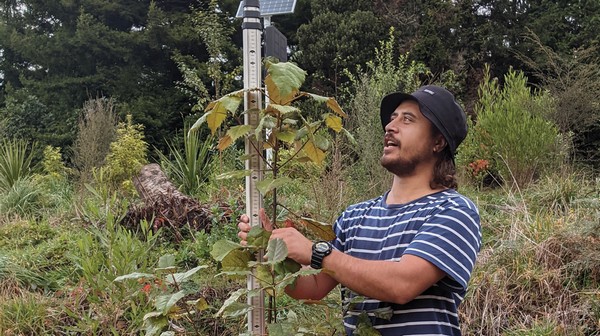The possibility of commercial scale production and establishment of indigenous tree species is opening up as tree species propagated in small paper pots survive and thrive as well as, or better than, those grown in larger plastic containers.
Nurseries are not currently well-equipped to meet the forestry scale deployment of indigenous species required for the One Billion Trees programme and other planting and revegetation projects. Producing large numbers of indigenous species is currently a slow, expensive and uncertain process. Problems include collecting and germinating seed, inefficient small scale and dated production practices and producing robust and vigorous plants that establish quickly. Pot sizes tend to be large, which adds to the cost and logistical challenges of establishment compared with smaller ‘forestry grade’ pots.
Scion has been working since 2019 on improving propagation techniques and technologies to accelerate the deployment of high-quality indigenous trees. The work has specifically addressed: identifying taxa suitable for production as a containerised forestry crop system; alternative growing systems for slower growers not suited to forestry crop systems; improved seed germination protocols and propagation via cuttings; mechanisation to address production bottlenecks; and using enclosed grow-out tunnels for faster growth and healthier, more vigorous plants.
Our trials have shown that 700 ml Ellepot paper growbags, formed and filled using automated Ellepot propagation technology, can be used to replace 1200 ml plastic bags, normally used for native tree production for all native species tested. Results were based on six field trial sites established in and around Rotorua. Apart from healthy plants, the advantages include reducing plastic waste by 90% (or more) and growing media/ container volume by 50% (making planting much easier and nursery growing more efficient).
Most indigenous tree species could also be established as seeds or cuttings in forestry grade containers (125 to 310 ml) using the current industry standards or paper-pots. This opens the possibility of commercial scale establishment of these species.
Scion ran several open days demonstrating the Ellepot paper pot propagation technology. Several New Zealand nurseries have subsequently invested in Ellepot machines.
Recommendations from this project will help all growers of indigenous plants and help boost the supply of trees for forestry, revegetation and restoration projects. Increased mechanisation also brings extra advantages to an industry challenged with labour issues, and nurseries’ long term social licence to operate will be bolstered as single use plastics are replaced with paper-based options.
Nursery partners involved in the establishment of the trees will benefit from easier, faster, and cheaper planting. There are also considerable advantages to the environment, and the whole country with more trees to establish, enhanced indigenous biodiversity and increased carbon sequestration.
Ngāti Whare, which runs Minginui Nursery, and many other iwi groups interested in similar projects, will also benefit from a successful nursery industry built on sound best-practice recommendations. Nurseries such as Minginui create jobs and boost local employment and participation...
Scion is currently looking at ways to build national nursery capability, particularly with hapū and iwi using what they have learned.
“Many New Zealand nurseries have contacted us after visiting Scion themselves or after having spoken to other nurseries who have seen the work being done at Scion with Ellepot. There is very much a move in New Zealand towards more sustainable methods of nursery propagation, and Ellepot ticks many of these boxes, and the results coming out of the work being done at Scion are confirming the many benefits available to New Zealand growers. We at Ellepot are very thankful for the partnership with Scion and look forward to continuing to support the great work being done.” - Darran Stone, Sales Manager – Africa, Middle East and Asia-Pacific, Ellepot
“My experience with Scion has been great. I now have 9000 Ellepot natives thriving on my property at Kaharoa. Despite a late planting date on the 23 September 2020, these plants have survived, and thrived, with almost no losses, and no extra help. Many are over 1.2-1.5 m tall now, in just 9 months. The continual progress has astounded me, these are the fastest growing natives I have ever experienced.” - Alison Dewes, farmer
“Working on this project with Scion has been invaluable to our commercial nursery in both looking at new ways to accelerate the propagation of indigenous trees and the trials of Ellepot’s paper pots, which we see as a must for the future. The Scion team were very professional, were able to substantiate their findings, and gave the entire project credence for the NZ nursery industry." - Diane Coleman, Managing Director, Treeline Native Nursery
Funders: Te Uru Rākau and Bay of Plenty Regional Council
Collaborators: Ngāti Whare (Minginui Nursery), Treeline Native Nursery, Ellepot, (Denmark), Rotorua Lakes Council, Tipu Wai Trust

